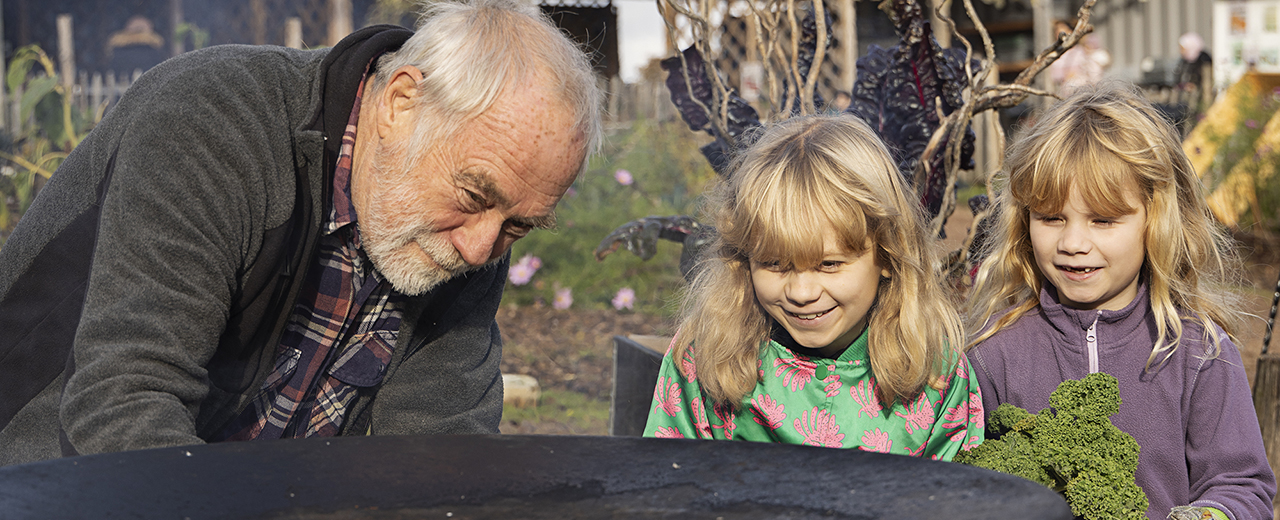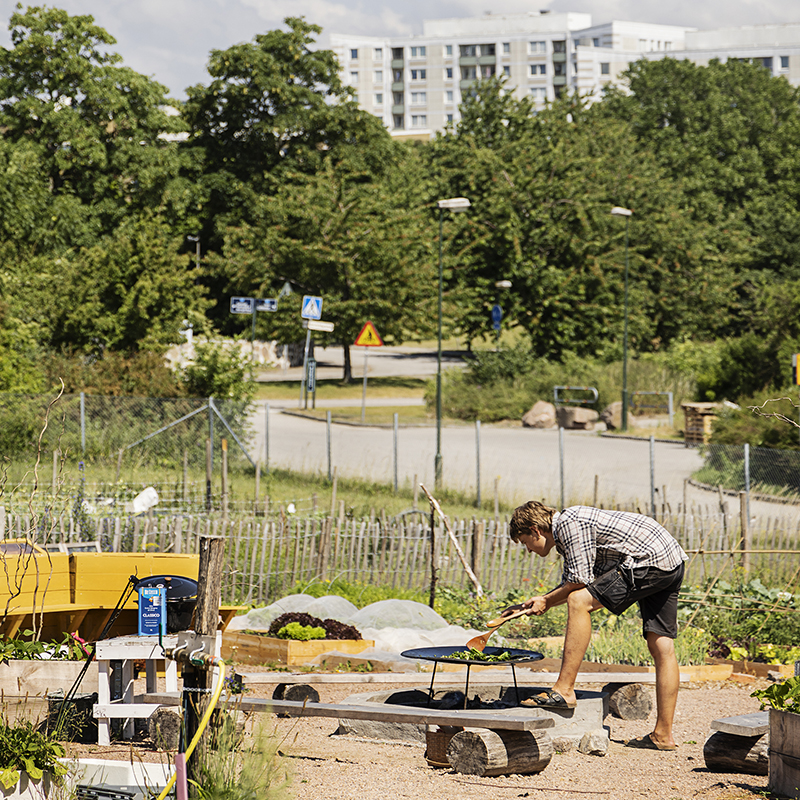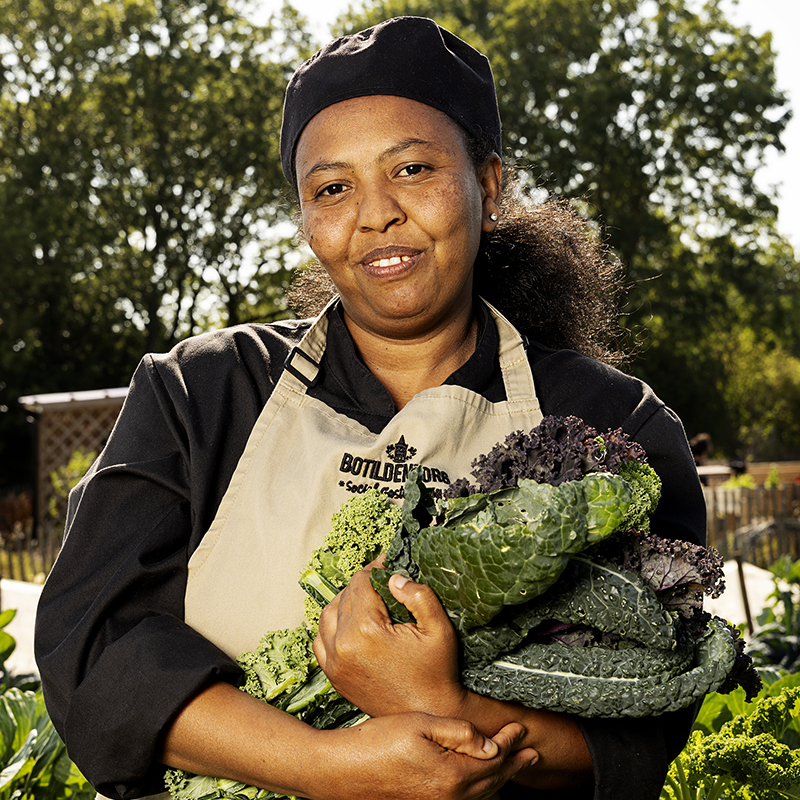
A One-Health neighbourhood

Amanda Gabriel
Lecturer at the Department of People and Society, SLU

Anna María Pálsdóttir
Senior Lecturer/Associate Professor at the Department of People and Society, SLU
“It’s remarkable to see how this place has blossomed over the past two decades. Twenty years ago, when the project was just beginning, it was hard to imagine a neighbourhood this vibrant, and yet so peaceful. The new eco-friendly street designs now link the parks with lush green corridors, and the urban farm has become a cherished meeting space where everyone feels welcome and included. And the river—what a difference it has made! Its calming presence has had a profound effect on residents’ mental well-being, and the biodiversity is thriving!
I remember how people, back in the 2020’s, used to stay inside. Even when the sun was shining. Today, children, elderly, teenagers – well, all ages, and all cultures, seem to have a place here, to meet and arrange all kinds of happenings. The multicultural Ögårds Festival in the summer is incredibly popular, with its wonderful mix of art, food and music.
Sure, we still have problems and areas that need improvement, but the community and sense of belonging is something completely different today. And it all started at the corner over there – in Botildenborg.”
BACK TO 2024
A sense of belonging
This house and farm were once part of a vast agricultural landscape outside the city. The majestic brick building has served as a maternity home, infant home, and preschool. Today, this piece of land is part of Malmö, a colourful city with 186 nationalities.
In Malmö, as in many large cities, there is a pressing need for integration, and many people find themselves marginalized, facing mental and physical health challenges. In recent years, Botildenborg has been designed to address exactly these issues, creating a space where people can meet, receive language training, find pathways into the workforce, and—most importantly—develop a sense of belonging.

At Botildenborg, food and farming are key tools for social change. Social and ecological resilience come together to develop methods that make a difference in people’s daily lives and contribute to the city’s future. Botildenborg serves many groups, including children and adolescents, the long-term unemployed, newly arrived refugees, seniors at risk of loneliness, teachers, and others. Here, people work hands-on at the urban farm, which has various health benefits and is a great activity to foster social interaction. Whether the purpose is to connect with nature, build friendships, or practice language skills, the natural environment and hands-on work foster a sense of well-being and joy. This setting opens conversations and can even offer a calming effect in unfamiliar social situations or during personal challenges.
SLU has been involved in Botildenborg’s work in various ways over the years, providing evaluation and support for the Växtplats Rosengård project, which focuses on migrants, and Växtplats Botildenborg, which supports individuals experiencing long-term unemployment.
Botildenborg harnesses the positive impact of cultivation work and green spaces to develop tailored methods and approaches for various target groups. Emphasizing inclusivity, Botildenborg has intentionally cultivated a welcoming culture where every participant feels valued and truly part of the community.
Having something meaningful to do is important, whether you are long-term unemployed, a child, or new to Sweden. Everyone wants to feel they are contributing to something. Coming to Botildenborg and participating in the cultivation and care of the garden fosters a sense of community and belonging.

As someone poor, sick, lonely, or a child, it is not certain that you will spend time in nature as a Malmö resident. For Botildenborg’s target groups, this green space serves as an oasis and a place for recovery, offering an environment where people can improve their well-being, discover new interests and skills, and experience personal growth. Through cultivating the land, participants gain a deeper appreciation for nature, the ecosystem, and the importance of conservation. Here, people from diverse backgrounds work together as equals, sharing responsibilities and fostering mutual understanding and openness.
Botildenborg exemplifies an urban healthscape — a vibrant, health-promoting landscape that extends its influence far beyond its own grounds, creating a ripple effect throughout the neighbourhood and broader community. Here, health isn’t just the absence of illness but a dynamic integration of mental, physical, social, and ecological well-being. Through a holistic approach combining green space, community engagement, and support for social resilience, Botildenborg’s design fosters a thriving, interconnected urban ecosystem where health becomes a shared community asset.
Back to URBAN HEALTHSCAPES theme page.
Botildenborg Social Farm & Kitchen
Botildenborg is a prize-winning meeting place and an urban farm in Malmö. They use food and farming as tools for social change and uses multidisciplinary activities to reach social, economic and environmental sustainability.
Go to their website
From SLU Knowledge Bank, in Swedish:
Trygg trädgårdsmiljö kan skapa en väg in på arbetsmarknaden
